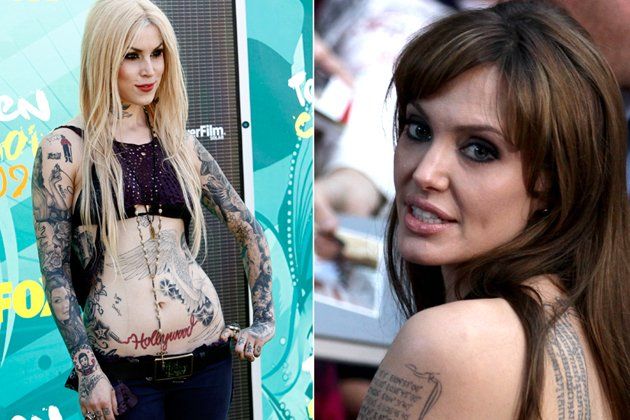
Natasha Kai holds two Olympic gold medals in soccer, but her arms are the most formidable parts of her body. They're covered in an embroidery of Polynesian tattoos: symbols and flowers that serve as an homage to her native Hawaii. "Most of them are out of boredom," Kai, 27, says. "Some people go shopping. When I have nothing to do, I go to a tattoo shop." She did that on Oct. 9, 2008, when she stepped into Kat Von D's Los Angeles parlor. "She wanted a rendition of God's hands holding the Chinese character for the word Believe," Von D writes in her new book, The Tattoo Chronicles. "Natasha told me 'Believe' is an affirmation that's used in the Olympics. 'If we believe in each other, then great things will come!"
Two decades ago, the only cultural icons with tattoos were rowdy and extreme—Dennis Rodman, Steven Tyler, Cher. Their inked up arms conjured images of rebellious behavior, life on the road, Hell's Angels. But today, even the most elaborate tattoos have gone mainstream--and the most innocuous celebrities, like Hilary Duff, Alyssa Milano, Jessica Alba, and Heidi Klum, are flaunting them. Tattoos are so widespread that a recent Visa commercial showcased the ultimate dilemma: running out of money mid-design. "It's definitely growing; kids are aspiring tattoo artists," says Von D, the star of TLC's tattoo reality show, LA Ink. "Before, that wasn't a real job."
Kai's tattoo journey was partly inspired by Von D, who got her first tattoo—the letter "J," for her boyfriend James—at age 14. While Kai doesn't exactly disappear in a crowd, she doesn't stand out, either. About 38 percent of millennials—people between the ages of 18 and 29—are inked, compared with 15 percent of their Baby Boomer parents, according to a study by the Pew Research Center. For that, we have pop culture to thank—or blame. "I definitely think the success of [my show] has contributed to the open-mindedness that people have inherited over the past few years," says Von D, who is not only a celebrity tattoo artist but also tattoos images of celebrities on fans. "When Michael Jackson died and Farrah Fawcett died, I got a lot of requests for portraits of them."
In 1991, Myrna Armstrong, a professor of health sciences, conducted a study of 154 working women with tattoos. Back then, the majority of respondents said their tattoos were hidden in places like their breast, groin, or upper thigh. "They wanted to control who saw them," Armstrong says. "They knew it was a mark some people didn't like." That fear has all but vanished, especially in a celebrity culture where nothing is private. Web sites are devoted to explaining the origins and meanings of all of Angelina Jolie's tattoos. Megan Fox has a line adapted from King Lear, "We will all laugh at gilded butterflies," on her shoulder, while Scarlett Johansson has a sunrise on her left arm to remind her to cheer up. Penélope Cruz still refuses to explain why she got the number "883" on her ankle. "Drew Barrymore, with all her daisy tattoos, she inspired a whole tattoo movement!" Von D says. "There's nothing prettier than a girl with a flower."
TV has kept up with the times. In 1984, when Jack Tripper on Three's Company got drunk and came home with a tattoo on his tush, he immediately rushed to the hospital to have it removed. In the '90s, tattooed characters—Tony on Who's the Boss, Uncle Jesse on Full House—were trying to escape their wild pasts. On Friends, Rachel conceals a heart tattoo on her hip. More recently, tattoos have become more pivotal to the intricate plots of Lost and Prison Break, and they are often the fabric of reality TV, from The Jersey Shore to The Real Housewives to Project Runway. (Not to mention the title of a certain international bestseller: The Girl With the Dragon Tattoo.) Jordin Sparks, the winner of American Idol in 2007, had a hit song with the lyrics: "Just like a tattoo, I'll always have you."
Lee DeWyze, American Idol's latest winner, has four tattoos on his arm. "One is like a picture of a Shel Silverstein poem," he says. "One is the Chicago flag. And one is Cat Stevens lyrics and [one is] John Lennon lyrics." Surprisingly, that didn't hinder his chances with the show's largely Christian audience, who judge the contestants by their lifestyles as much as by their voices. It might have even helped. "We're beginning to see in college students an increased prevalence of religious tattoos," says Jerome Koch, a professor of sociology at Texas Tech University who studies tattoos. "Instead of showing deviance, it shows faith."
Still, it's sometimes hard to overcome old stigmas about tattoos and deviant behavior. Von D says her conservative parents objected at first. "I wasn't a bad kid," she says. "but they associated tattoos with criminal activity. For a long time, people were like, she's so gnarly, like a biker. I'm pretty much a wuss and a nerd." Kai felt a similar pushback from home. "My family is Mormon; it's not accepted in the church," she says. "My mom told me after my sixth one, I wasn't allowed to get any more." So much for that: from head to toe, care to guess how many tattoos Natasha Kai has? A grand total of 45—for now.
Uncommon Knowledge
Newsweek is committed to challenging conventional wisdom and finding connections in the search for common ground.
Newsweek is committed to challenging conventional wisdom and finding connections in the search for common ground.
About the writer
To read how Newsweek uses AI as a newsroom tool, Click here.






